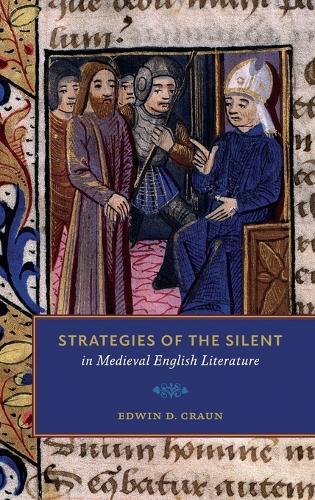Overview
Silence, like speech, is a mode of communication that can be used strategically. In Strategies of the Silent in Medieval English Literature, Edwin D. Craun investigates the silences in public life that punctuate talk in late Middle English literature. Centering his study on readings of canonical texts, including the works of Thomas Hoccleve, the anonymous Mum and the Sothsegger, William Langland’s Piers Plowman, John Lydgate’s translation of Guillaume de Deguileville’s Pelerinage de vie humaine, The Testimony of William Thorpe, a selection of the York cycle of passion plays, and The Book of Margery Kempes, Craun recovers the widespread moral discourse on silence developed by late medieval secular and clerical writers, who compiled materials from Roman popular morality and Stoic texts as well as Jewish wisdom books and Christian texts. These texts model how silence could play a role in effective government, respond to violent and angry antagonists, or in some cases to entirely obviate a good outcome. Through this nuanced exploration of the ethics of communication in medieval moral, narrative, and dramatic literature, Craun shows us that public silences, then as now, have strategies and consequences, dimensions that medieval imaginative writers explore subtly yet analytically in order to provoke ethical reflection and pragmatic action. Strategies of the Silent in Medieval English Literature offers original thematical and rhetorical insights into the written history of silence. It will appeal to scholars, graduate students, and advanced undergraduates interested in Middle English literature, history, and political thought.
Full Product Details
Author: Edwin D. Craun (Washington and Lee University)
Publisher: Pennsylvania State University Press
Imprint: Pennsylvania State University Press
Dimensions:
Width: 15.20cm
, Height: 2.00cm
, Length: 22.90cm
Weight: 0.426kg
ISBN: 9780271099910
ISBN 10: 0271099917
Pages: 210
Publication Date: 19 August 2025
Audience:
Professional and scholarly
,
College/higher education
,
Professional & Vocational
,
Postgraduate, Research & Scholarly
Format: Hardback
Publisher's Status: Active
Availability: Manufactured on demand

We will order this item for you from a manufactured on demand supplier.
Reviews
“In this new and exciting study, Edwin Craun recovers the centrality of silence to late medieval discourse. Through insightful explorations of clerical authors, he shows that the choice of when to speak and when to remain silent was ethically fraught. Craun also shows that such vexed questions greatly influenced Middle English literary authors, shedding important new light on Hoccleve, Langland, and George Ashby, among others.” —Michael Johnston, author of The Middle English Book: Scribes and Readers, 1350–1500 “The book draws on Craun's deep knowledge of medieval theories about the use and abuse of language; it moves fluently from Latin to vernacular, alert throughout to how silence acquires its meaning from its contexts, which Craun shows us are nearly always both textually embedded and sharply instantiated in the world.” —Nicolette Zeeman, author of The Arts of Disruption: Allegory and Piers Plowman
Author Information
Edwin D. Craun is Professor Emeritus of English at Washington and Lee University. He is the author of Ethics and Power in Medieval English Reformist Writing and Lies, Slander, and Obscenity in Medieval English Literature: Pastoral Rhetoric and the Deviant Speaker and editor of The Hands of the Tongue: Essays on Deviant Speech.



